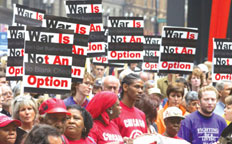No refuge for U.S. war resisters in Canada (FCN, 12-17-2007)

WASHINGTON (FinalCall.com) – In the ’60s and ’70s, Canada was a refuge for war resisters and conscientious objectors during the Vietnam War. Iraq war resistors want the same reception and protested at Canadian consulates from coast to coast as part of Courage To Resist’s “Dear Canada: Let Them Stay” campaign.
“We had actions in eight cities Jan. 25, at five Canadian consulates around the county on behalf of war resisters in Canada,” Max Diorio of Courage to Resist told The Final Call.
“Thousands of soldiers are AWOL. The military doesn’t know how many or where they are. Canada was a safe haven, but the climate now has Canada wanting to be on the good side of the United States.”
Hundreds of U.S. military personnel are in Canada because of decisions not to participate in U.S. wars and the occupation in the Middle East. There is no legal or political provision in effect in Canada that affords U.S. war resisters the right to stay in the country.
Deportation looms as a real threat for many women and men seeking refuge from prosecution south of the border, even as widespread support for the rights of resisters to stay grows among Canadians.
Mike Wong, a Vietnam veteran and war resister who spent five years in exile in Canada, was a delegate to Canada’s consulate in San Francisco.
“The war in Iraq is an open violation of both U.S. and international law, and is clearly illegal. Further, both U.S. and international law state that soldiers have the duty, not the option, to refuse illegal orders. I call upon the Canadian government to grant GI resisters the refugee status that they so clearly deserve,” he said.
Supporters in Canada and the U.S. are urging the House of Commons, which reconvenes this month, to follow the recommendation of its Standing Immigration Committee which voted on December 6, 2007, to recommend that the Canadian government immediately implement a program to allow Iraq War resisters, and resisters of any war not sanctioned by the United Nations, and their families to stay in Canada.
Political action is considered crucial. The possibility of resisters being granted refugee status in Canada by the courts was effectively ended when the Canadian Supreme Court refused to hear the appeal of U.S. resisters Jeremy Hinzman and Brandon Hughey.
During the Vietnam War, Canada had no system to determine refugee status. U.S. draft dodgers were treated as immigrants. Canadian Prime Minister Pierre Trudeau publicly condemned the war and affirmed Canada should be “a refuge from militarism.”
Times have changed.
Jonathan Sauvé, deputy spokesperson for the Canadian consulate in Washington, told The Final Call, “Canada has one of the most generous refugee systems in the world. Canadians want a refugee system that helps those in need of protection. All refugee claimants in Canada have the right to due process, and when they have exhausted legal avenues we expect them to respect our laws and leave Canada.
“Due to privacy legislation, I cannot comment on specific cases. However, in general, I can say that each claim is assessed on its own merits. Additionally, Canada’s refugee protection system allows ample opportunity for claimants to challenge decisions made concerning their claims. As for a special program or category for war resisters, Canada already has an immigration policy, which is both fair and consistent in its application,” he said.
War resisters and Iraq veterans argue the Canadian policies aren’t consistent with her history.
Geoff Millard, D.C. chapter president of Iraq Veterans Against the War and outspoken advocate for allowing war resisters to stay in Canada, said, “Before I spent 13 months in Iraq, I looked at Canada as an option, but it wasn’t realistic to me. I violated my conscience in going to Iraq, which may not have been the case if Canada had been accepting war resisters of conscience at that time.”
According to historical accounts and the U.S. government, as many as one million men resisted the draft during the Vietnam War. Pentagon figures show 209,517 were soldiers formally charged with violating draft laws. Of 25,000 who were indicted, only 4,000 were found guilty and served time in jail.












